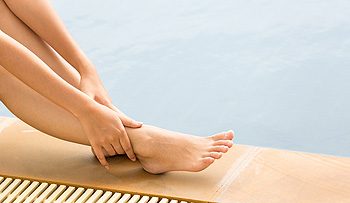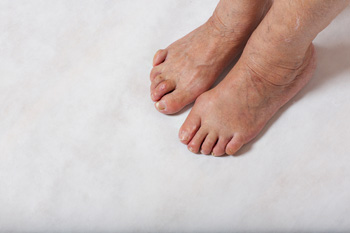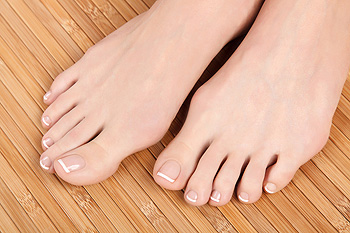
(908) 381-8160Berkeley Heights
 The feet are considered to be the foundation of the body, which is why it is important to take proper care of them. When this is properly accomplished, mobility and flexibility may be improved, and general aches and pains may diminish. Common foot problems that may be prevented by maintaining healthy feet can include bunions, hammertoes, and tendinitis. It is important to wear shoes that fit properly, maintain a healthy weight, and practice good foot hygiene. Additionally, it may be beneficial to perform gentle stretching techniques, which may help the feet to become strong. If additional information is needed about the importance of learning everyday foot care, please consult with a podiatrist.
The feet are considered to be the foundation of the body, which is why it is important to take proper care of them. When this is properly accomplished, mobility and flexibility may be improved, and general aches and pains may diminish. Common foot problems that may be prevented by maintaining healthy feet can include bunions, hammertoes, and tendinitis. It is important to wear shoes that fit properly, maintain a healthy weight, and practice good foot hygiene. Additionally, it may be beneficial to perform gentle stretching techniques, which may help the feet to become strong. If additional information is needed about the importance of learning everyday foot care, please consult with a podiatrist.
Everyday foot care is very important to prevent infection and other foot ailments. If you need your feet checked, contact Dr. Janet Leicht from New Jersey. Our doctor can provide the care you need to keep you pain-free and on your feet.
Everyday Foot Care
Often, people take care of their bodies, face and hair more so than they do for their feet. But the feet are a very important aspect of our bodies, and one that we should pay more attention to. Without our feet, we would not be able to perform most daily tasks.
It is best to check your feet regularly to make sure there are no new bruises or cuts that you may not have noticed before. For dry feet, moisturizer can easily be a remedy and can be applied as often as necessary to the affected areas. Wearing shoes that fit well can also help you maintain good foot health, as well as making it easier to walk and do daily activities without the stress or pain of ill-fitting shoes, high heels, or even flip flops. Wearing clean socks with closed shoes is important to ensure that sweat and bacteria do not accumulate within the shoe. Clean socks help to prevent Athlete’s foot, fungi problems, bad odors, and can absorb sweat.
If you have any questions please feel free to contact our office located in Berkeley Heights, NJ . We offer the newest diagnostic and treatment technologies for all your foot and ankle needs.
 The medical condition that is referred to as ingrown toenails can often cause severe pain and discomfort. It occurs when the nail on the big toe grows into the outer edges of the skin. The symptoms that are often associated with this ailment can include redness, tenderness, and swelling on or around the affected area. The body may naturally produce a yellowish fluid that may drain from the toe, which can be a result of the irritation an ingrown toenail may cause. The foot may feel better after it is soaked in warm water, and this can soften the skin surrounding the nail. If medical conditions exist that include diabetes or fungal infections, it is strongly suggested that you are under the care of a podiatrist who can help you to manage this ailment.
The medical condition that is referred to as ingrown toenails can often cause severe pain and discomfort. It occurs when the nail on the big toe grows into the outer edges of the skin. The symptoms that are often associated with this ailment can include redness, tenderness, and swelling on or around the affected area. The body may naturally produce a yellowish fluid that may drain from the toe, which can be a result of the irritation an ingrown toenail may cause. The foot may feel better after it is soaked in warm water, and this can soften the skin surrounding the nail. If medical conditions exist that include diabetes or fungal infections, it is strongly suggested that you are under the care of a podiatrist who can help you to manage this ailment.
Ingrown toenails may initially present themselves as a minor discomfort, but they may progress into an infection in the skin without proper treatment. For more information about ingrown toenails, contact Dr. Janet Leicht of New Jersey. Our doctor can provide the care you need to keep you pain-free and on your feet.
Ingrown Toenails
Ingrown toenails are caused when the corner or side of a toenail grows into the soft flesh surrounding it. They often result in redness, swelling, pain, and in some cases, infection. This condition typically affects the big toe and may recur if it is not treated properly.
Causes
You are more likely to develop an ingrown toenail if you are obese, have diabetes, arthritis, or have any fungal infection in your nails. Additionally, people who have foot or toe deformities are at a higher risk of developing an ingrown toenail.
Symptoms
Some symptoms of ingrown toenails are redness, swelling, and pain. In rare cases, there may be a yellowish drainage coming from the nail.
Treatment
Ignoring an ingrown toenail can have serious complications. Infections of the nail border can progress to a deeper soft-tissue infection, which can then turn into a bone infection. You should always speak with your podiatrist if you suspect you have an ingrown toenail, especially if you have diabetes or poor circulation.
If you have any questions, please feel free to contact our office located in Berkeley Heights, NJ . We offer the newest diagnostic and treatment technologies for all your foot care needs.
 The medical condition that is known as hammertoe may be caused by a muscle imbalance. This can gradually develop as a result of wearing shoes that do not have ample room for the toes to move freely in. Additionally, it may occur as a result of genetic factors, or from high arches or arthritis. This ailment typically affects the second or third toe. Corns and calluses can form on top of the affected toes, which may cause pain and discomfort. Some patients may find mild relief if a cushioned bandage is worn over the toes, as this may help to avoid friction while wearing shoes. In severe cases of hammertoe, surgery may be necessary to perform. This may be helpful in permanently straightening the toes. If you have hammertoe, please schedule a consultation with a podiatrist who can offer you treatment options that are correct for you.
The medical condition that is known as hammertoe may be caused by a muscle imbalance. This can gradually develop as a result of wearing shoes that do not have ample room for the toes to move freely in. Additionally, it may occur as a result of genetic factors, or from high arches or arthritis. This ailment typically affects the second or third toe. Corns and calluses can form on top of the affected toes, which may cause pain and discomfort. Some patients may find mild relief if a cushioned bandage is worn over the toes, as this may help to avoid friction while wearing shoes. In severe cases of hammertoe, surgery may be necessary to perform. This may be helpful in permanently straightening the toes. If you have hammertoe, please schedule a consultation with a podiatrist who can offer you treatment options that are correct for you.
Hammertoe
Hammertoes can be a painful condition to live with. For more information, contact Dr. Janet Leicht from New Jersey. Our doctor will answer any of your foot- and ankle-related questions.
Hammertoe is a foot deformity that affects the joints of the second, third, fourth, or fifth toes of your feet. It is a painful foot condition in which these toes curl and arch up, which can often lead to pain when wearing footwear.
Symptoms
Causes
Genetics – People who are genetically predisposed to hammertoe are often more susceptible
Arthritis – Because arthritis affects the joints in your toes, further deformities stemming from arthritis can occur
Trauma – Direct trauma to the toes could potentially lead to hammertoe
Ill-fitting shoes – Undue pressure on the front of the toes from ill-fitting shoes can potentially lead to the development of hammertoe
Treatment
Orthotics – Custom made inserts can be used to help relieve pressure placed on the toes and therefore relieve some of the pain associated with it
Medications – Oral medications such as anti-inflammatories or NSAIDs could be used to treat the pain and inflammation hammertoes causes. Injections of corticosteroids are also sometimes used
Surgery – In more severe cases where the hammertoes have become more rigid, foot surgery is a potential option
If you have any questions please contact our office located in Berkeley Heights, NJ . We offer the newest diagnostic and treatment technologies for all your foot and ankle needs.
 Patients who have chronic foot pain may be aware of the benefits that reflexology may have on the feet. This may be a result of engaging pressure points that relate to different organs in the body. Having reflexology performed on the feet may help patients who suffer from plantar fasciitis, in addition to general wear and tear of the tendons and ligaments. It may also be beneficial in cleansing the immune system, as well as improving circulation. If you would like additional information about reflexology and how it is performed, it is suggested that you schedule a consultation with a podiatrist.
Patients who have chronic foot pain may be aware of the benefits that reflexology may have on the feet. This may be a result of engaging pressure points that relate to different organs in the body. Having reflexology performed on the feet may help patients who suffer from plantar fasciitis, in addition to general wear and tear of the tendons and ligaments. It may also be beneficial in cleansing the immune system, as well as improving circulation. If you would like additional information about reflexology and how it is performed, it is suggested that you schedule a consultation with a podiatrist.
Foot therapy is often necessary for those recovering from either foot deformities or foot injuries. If you have concerns regarding therapy, Dr. Janet Leicht of New Jersey. Our doctor can provide the care you need to keep you pain-free and on your feet.
Most Common Injuries
People who are active or athletes are prone to a variety of injuries. Therefore, it is often important to take part in physical therapy in order to quickly get back on the right track.
What to Do When Injured
Physical Therapy – This specialized treatment will focus on the affected area, speeding up recovery and the overall healing process. It is a proven method that has helped millions of people return from any injury.
During physical therapy you will undergo regimented training to get back into full form. Training is often very difficult, especially at first when the foot feels weak. Physical therapy often involves:
Basic stretching and twisting exercises – getting the feet’s mobility and flexibility up.
Massaging – the therapist will massage the injured area in order to activate the muscles and relax them.
Strengthening Exercises – this allows the muscles in the affected area to regain their full strength, a vital step towards full recovery.
If you have any questions please feel free to contact our office located in Berkeley Heights, NJ . We offer the newest diagnostic tools and technology to treat your foot and ankle needs.